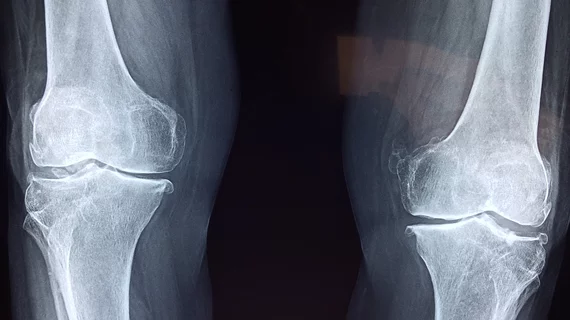Nonsurgical IR treatment reduces chronic knee pain for adults over 50
People over age 50 with chronic knee can pain enjoy significant pain reduction after genicular nerve radiofrequency ablation, according to new research to be presented at the Society of Interventional Radiology’s Annual Scientific Meeting in Phoenix, Arizona.
The nonsurgical, minimally invasive treatment uses image guidance to position probe needles near sensory nerves in the knee that send pain signals to the brain. Then, using radio waves, the probes use heat to dull or destroy the adjacent nerve endings.
“These nerves do not control muscles or affect balance, making the procedure safe. Furthermore, patients leave with Band-Aids, not stitches,” the Reis Group reports in a statement about the research.
While the treatment has already been known to be effective in many cases, the new research—which measured pain reduction for 36 patients—sheds light on which patients are most likely to see the greatest benefits, as well as which patients may want to consider other options. Observing that the largest reductions in pain levels were seen in those who were over age 50, researchers suggest that the treatment is more effective for knee pain caused by osteoarthritis than by injuries.
“We know this treatment has clear benefits in reducing pain and improving the ability to do everyday activities for patients,” said Kaitlin Carrato, MD, chief resident in interventional radiology at MedStar Georgetown University Hospital, in the Reis Group statement. “But now that we know it’s particularly helpful for those over 50 years old, it may mean that those with chronic pain conditions, like arthritis, would benefit more from this treatment than patients suffering acute pain, such as an injury.”
In addition to those who are simply looking to avoid surgery, some people are not good surgical candidates due to issues such as medical comorbidities or a high body mass index. Others who may benefit from genicular nerve radiofrequency ablation include patients who have already undergone a failed knee replacement.[1]
“Roughly one in four U.S. adults have knee pain,” said John B. Smirniotopoulos, MD, an interventional radiologist at MedStar Georgetown University Hospital, in the statement. “This treatment can offer many of those people a chance to enjoy everyday activities and regain a higher quality of life by decreasing the pain that they experience on a daily basis.”
